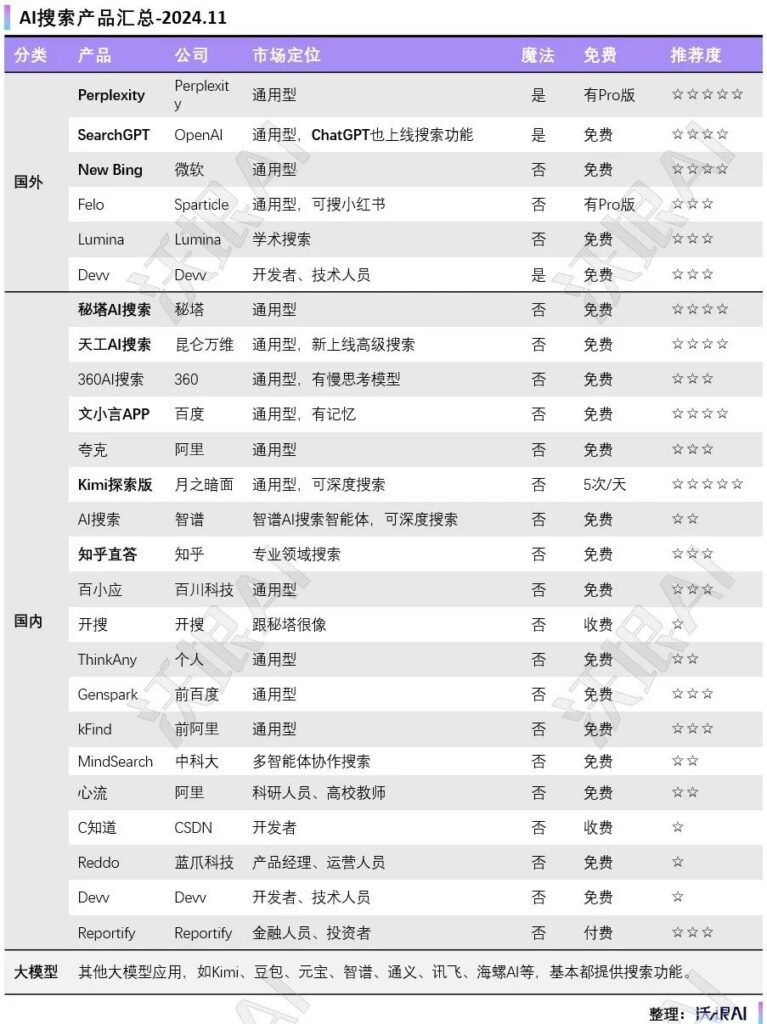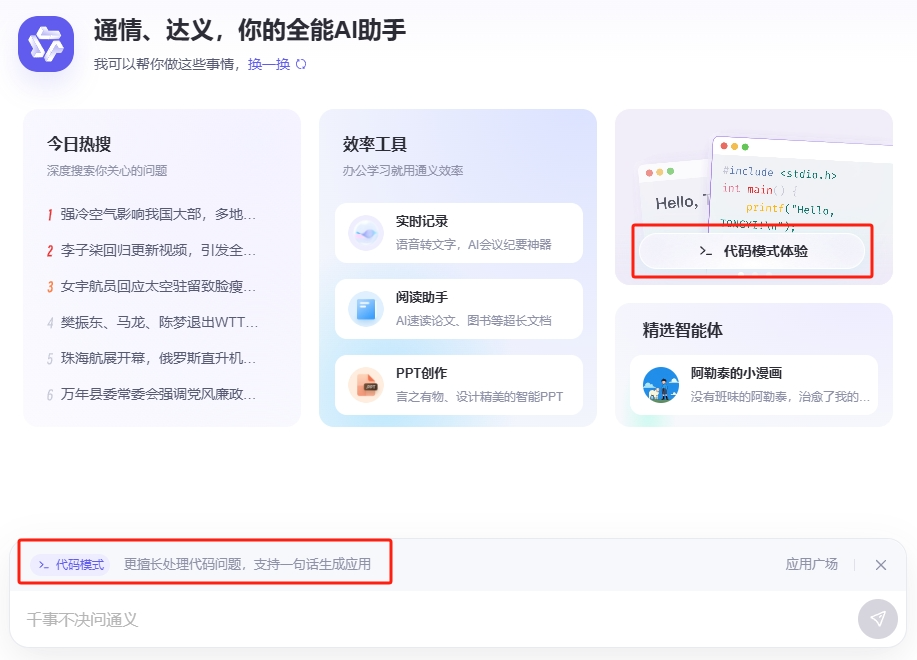Recently, even ChatGPT has launched a search function. AI search has never been this bustling. Outside China, new and old players such as Perplexity, SearchGPT, Genspark, New Bing, and Felo have taken turns on the stage, along with Google’s poorly performing AI Overview. Inside China, products like Mita, TianGong, Kuaishou, 360, Baixiaoying, Zhihu, and several vertical-field AI search products have emerged.
Meanwhile, major model manufacturers are also going full steam ahead, launching new AI search functions. Kimi has launched an exploration version, Zhipu has released an AI search agent, Zhihu Direct Answer has launched a professional search, and TianGong AI has released an advanced search (unlimited use). It seems that any product without an advanced search (some also call it “deep search”) doesn’t deserve to be called an AI search.Yesterday, TianGong AI launched an advanced search function. Whoever you are, please don’t assume it’s about you. I’m not talking about you! Today, let’s talk about a Japanese AI search product – Felo.ai. Although it’s a Japanese company (Sparticle Co., Ltd.), it has been optimized for the Chinese user market everywhere. As soon as you open the website, the default interface is in simplified Chinese. Experience address: https://felo.ai
There are already many AI search products. What makes Felo different? Here are some of my actual test summaries. 1) Can search closed platforms such as Xiaohongshu and Reddit In China, high-quality graphic and text content mainly exists in three places: Zhihu, official accounts, and Xiaohongshu. Currently, apart from Xiaohongshu’s own Da Vinci Assistant, only Felo can search Xiaohongshu. Even Kimi, which is invested in by Xiaohongshu, cannot search the content on Xiaohongshu. Abroad, high-quality content and first-hand news are mainly on Reddit and X, and Felo can also search these two platforms. Felo calls your Xiaohongshu account to search for note content by installing a browser plugin (magic required), and then quotes the note content to answer questions. If it’s inconvenient to use magic, you can also use the Edge browser to search for “Felo” and install the plugin. The answers will be structured. If you don’t want to look at the colorful notes and emojis on Xiaohongshu and only want to see well-organized, concise content, you might as well give Felo a try. 2) Can choose the answering model Felo provides GPT-4o, o1-mini, Claude 3.There are multiple models such as 5 Sonnet, Gemini 1.5 Pro, Llama 3.1 for users to choose from. For daily answers, the default model is GPT-4o. If users choose other models, they need to subscribe to the Pro membership. The monthly card costs at least $12.5. Of course, users can have 5 free trials every day. In addition, Felo has recently launched a deep reasoning mode, similar to OpenAI’s o1 model or Kimi’s exploration version, which can solve complex problems. This function can be experienced together with the Pro function. For example, when we asked Felo the questions we used to test Kimi’s exploration version, the answers were a bit disappointing. Even considering leap months, the answer should be 84 – 85 days instead of 75 – 85 days. This ‘deep reasoning’ seems a bit unreliable. Well, let’s move on to the next question. Felo thought C was the thief. Congratulations… it got the answer wrong. For the specific demonstration process, please refer to the previous article. Okay, it’s hard for you as I asked an original question with no searchable answer. Then let’s look at a pure search question. Question: Which novels of Ma Boyong have been adapted into TV dramas and what are their ratings on Douban? Are there only these few? There should be more. Let’s see Kimi’s exploration version’s answer. Kimi found a total of 10 novels and crawled the real-time ratings on Douban one by one. For example, Felo’s data for the rating of ‘The Longest Day in Chang’an’ is incorrect because its answer was retrieved from other websites without checking Douban. When ‘The Longest Day in Chang’an’ first aired, its rating was indeed 7.9 points, but the rating has been rising after it finished airing and is now up to 8.1 points. However, Felo also has a great feature worthy of other AIs to learn from. It supports deleting information sources and regenerating answers. If you think a certain website is unreliable, you can delete it and let the AI answer again. Although the second answer was correct, Felo only found 6 novels. For users, when they ask questions, they must not know the answers. If an AI hides information or gives wrong answers, it is very difficult for users to correct and verify the accuracy of the AI’s answers. This is also a common problem of some current AI search products, and there are still many hallucination problems. The reasons for this problem will be analyzed at the end. 3) Cross-language search. ‘Search the world in your language’ is Felo’s slogan. Users only need to ask Felo questions in their mother tongue, and Felo can search and understand content in other languages, providing cross-language search results for users.
For instance, when I asked Felo to introduce the UK-based Recraft AI company, the one behind the Red_panda model that outperformed MJ and Flux as mentioned in my previous article, Felo’s first source of information was directly from the Recraft AI official website, which is highly reliable. Even with my limited English proficiency, I can quickly access first-hand information through Felo’s search without relying on third-party translation software.
For the same question, I tested it across several major AI platforms in China (Zhipu, Yuanbao, Tongyi, Doubao, Tiangong, and Wenxin Yayan), and it seems that only Kimi possesses cross-language search capabilities. Other AI platforms will still prioritize Chinese data unless you use strict prompt words (such as ‘please use English materials’) to limit the search scope. For more obscure questions, like asking for Chinese restaurants in Akron, the hometown of NBA star Stephen Curry, Felo’s ability to search for images and videos is not a new feature but rather an encapsulation of multimedia search functionality. As for the rest, features like generating mind maps, rewriting answers, question recommendations, secondary questioning, numerical footnotes, academic searches, and document searches are now considered standard features in AI search. Felo’s side panel includes a ‘Topic Collection’ entry, which supports users in creating their own topic collections to store and manage questions they have searched on Felo. You can think of this feature as ‘search notes,’ allowing you to add some good AI responses to topic collections. In the future, you can ask questions and index topic collections at any time, quickly retrieving information from existing search results. Lastly, this is my light review of the Japanese AI Felo. I also welcome everyone to share their review experiences in the comment section after trying it. The red mecha image is originally provided by @DerekWen. This year indeed is a big year for AI search products. Currently, AI search products on the market are mainly divided into three categories: 1) specialized AI search products, such as Perplexity, Manta AI Search, SearchGPT, Felo, Zhihu Direct Answer, etc. 2) traditional search engines with AI capabilities, such as New Bing, Google AI Overview, Baidu AI Intelligent Answer, 360 AI Search, Quark, etc. 3) large models launching AI search functions, such as Kimi Exploration Edition, Zhipu AI Search, Wen Xiaoyan, Tiangong AI Search, Yuanbao, Doubao, Tongyi, etc. Regarding the underlying principles of AI search, @Jiazi Guangnian introduced that it can be summarized by ‘RAG (Retrieval-augmented Generation, retrieval-enhanced generation),’ involving two steps: Retrieval and Generation.Most of the ‘Retrieval’ is accomplished through APIs of traditional search engines, with a minority utilizing self-built index libraries; while AI search products primarily focus on ‘Generation’ after obtaining results, using AI to replace manual labor, reading the retrieved content, summarizing, and providing users with a direct answer. In simple terms, data is sourced from traditional search engines, summarized by large models, and then delivered back to users through AI search.
Hence, Perplexity also refers to itself as an ‘Answer Engine.’ It encapsulates product functionality rather than technological innovation. Most AI search products are like this. By now, you should understand what the core of AI search products is – database and model capabilities. How do we get the data? By purchasing APIs from search engine vendors (a few like Bita and 360 build their own index libraries); how do we obtain model capabilities? By waiting for updates from OpenAI. Therefore, the technological gap among most AI search products on the market is not significant. The key lies in each product’s encapsulation capabilities and the ability to explore user needs and perceptions. Finally, if you ask me about the recommendation stars for Felo, my answer is: average. Some new features are worth trying out and are worth learning from for domestic manufacturers.


